Starting from September 14, 2017, Lithuania’s Kazimieras Simonavičiaus University will be accepting payments in cryptocurrency. The university is the first to offer this way of payment for studies in Lithuania, and one of only a handful in the Baltic Sea region.
Students willing to pay for their studies in cryptocurrencies should contact the university’s administration and their payments will be accepted according to the exchange rate of the chosen currency. Using the www.spectrocoin.com service, the university can accept payments in Bitcoins, Ethereum, Dash and other unorthodox currencies.
The university’s Rector, Professor Arūnas Augustinaitis, says that the decision to accept the new currencies in a relatively straightforward step in the implementation of the institution’s overall strategy. “We believe that the university has to show the way for other science and education institutions as well as for business. Payments in cryptocurrencies are more convenient because of the speed and the price. Moreover, this is attractive for foreign students” believes Mr. Augustinaitis. The university also invites other universities and businesses to open up to new ways of thinking and doing business.
Although payments in cryptocurrencies have been around for the last decade, it’s an entirely new approach within education. There remain very few universities that accept payments in cryptocurrency anywhere in the world. Usually they tend to create conditions for students of technological, business or economics programmes. One of the leaders in this field is the University of Nicosia in Cyprus. The university accepts all payments in cryptocurrency, with almost two percent of its students taking advantage of the opportunity. Payment for cryptocurrencies is also accepted in the private University of the Americas as well as in several departments in other Universities around the world.
The financial technologies industry has been turning financial markets upside-down for several years. Lithuanian and international financial institutions as well as numerous regulation offices are shifting their focus away from evaluating the significance of the cryptocurrencies phenomena towards integrating these new business models into the traditional finance sector.
Professor Sinan Laçiner from Cumhuriyet University (Turkey) will give lecture „Comparative Media Systems: Turkey and Lithuania“ at Kazimieras Simonavicius University on 15 September (Friday). Lecture will start at 1.45 p.m. in room no. 212.
The professor will present theoretical models of comparative media systems, contemporary media problems in various countries, emphasizing Turkey and Lithuania.
Future journalists are especially invited to this lecture, but other students are also very welcome as the lecture is open.
Language of instruction – English.
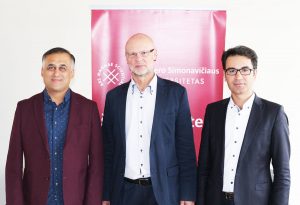
Dr. Necmi Uyanik, Prof. Dr. Arūnas Augustinaitis and Assoc. Prof. Dr. Muhammet Erbay
Representatives from Selçuk University (Turkey), dean of Tourism Department Assoc. Prof. Dr. Muhammet Erbay, and professor at the Faculty of Letters, Department of History Dr. Necmi Uyanik visited Kazimieras Simonavičius University to discuss the cooperation opportunities with KSU rector Arūnas Augustinaitis.
Selçuk University has recently established new department of Civil Aviation Management and chose KSU as the prospective partner to develop joint degree programme and strengthen its‘ ties to Lithuania.
At the meeting, KSU rector and guests also discussed the development of Turkish culture in the Baltic region. Assoc. Prof. Dr. Muhammet Erbay shared his experience gained while studying in Lithuania.
KSU Brunch
This year on the 1st of September lecturers, administrative staff and KSU students meet for the KSU Brunch!
University’s community will celebrate the new academic year in the informal settings, listening to live music, engaging in relaxing conversations, and activities. “Less official speeches, more interaction” – has become the motto of the 1st September festivities at KSU.
For the first time Kazimieras Simonavičius University celebrates the start of the academic year in it’s new premises. The event will take place at 21 Dariaus ir Girėno St., Vilnius and start at 11 AM on the 1st of September, 2017. Organisers invite you to arrive 10-15 minutes earlier.
Snacks and beverages will be served to all Participants of KSU Brunch, but registration is obligatory. To register fill in this registration form.
After the Brunch, KSU Student Association invites all KSU students and graduates to participate in the after party “Duzgės”! More information on the party will be provided during the Brunch.
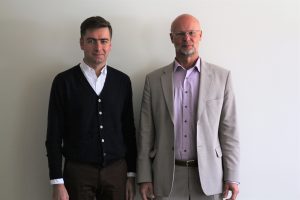
Laimonas Talat-Kelpša and Prof. Dr. Arūnas Augustinaitis
On July 5, Laimonas Talat-Kelpša, the Ambassador of the Republic of Lithuania to India, and his wife Alina visited Kazimieras Simonavičius University (KSU). Ambassador together with the Rector of KSU Prof. Dr. Arūnas Augustinaitis, Chancellor Darius Verbyla, Prof. Dr. Jolanta Zabarskaitė and International Relations Coordinator Dr. Javed Imran discussed the situation of the foreigners who come to study in Lithuania and the problems they face, were looking for solutions that can facilitate the arrival and establishment of foreign students in Lithuania.
KSU Rector Prof. Dr. Arūnas Augustinaitis states: “At present, the University is going through a qualitatively new stage of internationalization. One of the most important areas for international cooperation is India, Pakistan, Bangladesh, Sri Lanka, Nepal – the main countries of the Indostan region. Kazimieras Simonavičius University seeks not only to attract more foreign students, but also to implement talent attraction and international research projects.
It is very important to discuss and find the solutions to the problems faced by foreign citizens wishing to study in Lithuania. Students from India, Sri Lanka and other countries are already studying at Kazimieras Simonavičius University, so we know how difficult is the processes of getting the visa and other travel documents. It is great that we were able to discuss these issues and the possible solutions together with the Lithuanian Ambassador to India. We also discussed opportunities for cooperation with South Asian universities, especially in the scientific and cultural fields.”
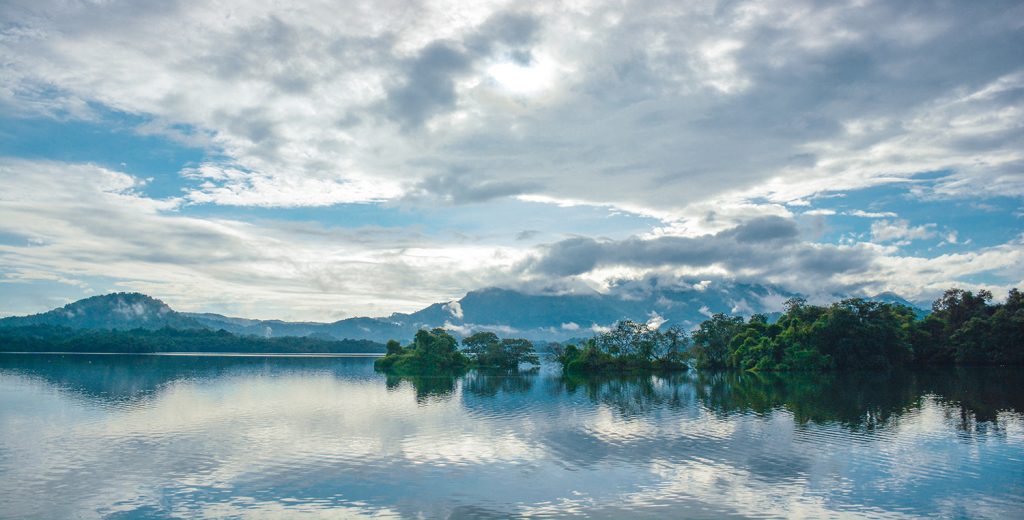
Sri Lanka. Saveen Randula’s photo.
Šri Lanka is a small island located in South Asia. With the area of 65,000km2, Sri Lanka is almost the same size as Lithuania. You can find a magnificent diversity of flora and fauna, of landscape and seascape and varied climate conditions from arid to cold. A diverse and multicultural country, Sri Lanka is a home to a few religions and languages. It is also a great tourist destination in South Asia. “We have eight world heritage sites including 8th Wonder of the World, Sigiriya (Lion Rock). And we make the finest tea in the world as well as we are the second large tea exporter in the World”, says Saveen Randula who came to Lithuania to study Aviation Management at Kazimieras Simonavičius University (KSU). Conversation with Saveen is about his way to Lithuania, Sri Lanka and his studies at KSU.
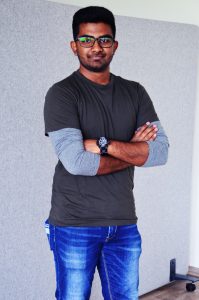
Saveen Randula. E. Nakvosaite’s photo
Lithuania and Sri Lanka seem to be very different countries. Is there anything that surprises you while living in Lithuania?
Here I found very peaceful, good environment, friendly and helpful people. The main difference is cultural difference, of course. Sri Lanka has rich culture based on Buddhism. Since I have been a few months in Lithuania, I may need some time to learn about its culture.
You study Aviation Management. How do you like your studies?
I think it is really interesting and enjoyable subject to study, and I do enjoy studying in KSU under an Aviation background and excellent lecturers.
How the idea to study in Europe did came to you?
My grandfather was an aircraft engineer who worked for Royal Air force, and he studied in the UK. He used to tell me how advanced aviation industry is in Europe. Since Europe has a magnificent development of aviation field, I always wanted to come to Europe to study.
Is it popular to go to study abroad in your country?
Yes, it is very popular. More and more people are going to China, Australia, New Zeland and Europe.

Sri Lanka. Saveen Randula’s photo.
Did you came here after the high school?
Yes, I finished high school in Sri Lanka and then went to China to study Chinese. My father works there. I searched for Aviation Management in China but unfortunately, there is no such a study programme in China’s universities. They have only Aviation training but there is no Aviation Management studies.
How did you choose the University?
I search through the internet and I found many universities in Europe, but only KSU provides more subjects. I applied directly to the University.
What do you do here on your free time? Have you found any interesting activities in Vilnius or other places of Lithuania?
The old architecture of the city and the beautiful views has attracted me so much. As a history explorer and photographer, I would love to read history and take photographs on my free time. I have not visited other cities yet because of my visa problems which I had on the way to Lithuania I did not want to go anywhere. I am afraid of that.
You do not have to worry now. Lithuania is a safe country.
Yes, that was one of the reasons why I came here. I checked other countries like German and USA but my dad did not want me to go to there. I also checked the UK universities but KSU offers more subjects. That is why I chose KSU. The Consul in Sri Lanka has also recommended Lithuania because it is a safe country.
What are your plans for the future (education, career, etc.)?
I am planning to continue my studies on Aviation until Masters Level. I will start my carrier in Aviation filed in Sri Lanka.
10 Kazimieras Simonavičius University students can participate in the Intensive Course “Organisation and Individual Security” for free. The course will take place in Turiba University (Latvia) on August 14-25th.
About the course:
In recent years security issues has become important also to Baltic and Nordic countries. World is coping such challenges as migration, conflicts based on different cultural backgrounds, cyber-attacks and other new challenges. This leads to fact that there is need for high quality training for young security specialists. Those specialists need knowledge and skills not only in subjects traditionally known as necessary for Security specialist, but also be able to manage the team and stress situations, be good intercultural communication specialist and cope with cyber-security challenges.
The course comprises theoretical programme, seminars as well as a set of interesting intensive practical lessons. During the two week course students will gain also practical knowledge in person’s and organisation’s security. Student will gain knowledge of assessment of security tactics for guarded sites, basics of tactical planning and implementation methods for threat prevention and their legal regulation; comprehensive knowledge of facts, theory and correlations necessary for carrying out work related tasks, personal growth and development, public participation and social integration.
Main topics of the course:
3 ECTS credits will be awarded for the completed course. Organizers will cover the project travel costs (bus tickets for Lithuanian students), pick-up service, accommodation, also catering, study visits, some free time activities. Course will be in English, so students must have knowledge of English.
If you want to participate, please fill in the application form and send it to KSU International Coordinator Vaiva Poškaitė-Tomaševič (international@ksu.lt) until June 21 .
More information: ABOUT NORDPLUS Intensive Course
Application form: APPLICATION FORM FOR STUDENTS
Partners:
Turiba University, Latvia
Kazimieras Simonavicius University
Turku School of Economics – BRDC, Finland
Every spring semester Tony Palmer come to Lithuania to teach Kazimieras Simonavičius University (KSU) Aviation Management students. He is an aviation expert and has a great experience in the industry. “I like sharing my experience, delegating and seeing people grow”, says Tony.
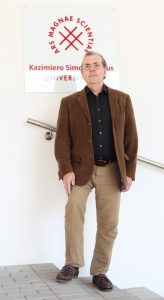
Tony Palmer
Aviation is one of the fastest growing sectors in the world. How do you think, what are the reasons of this growth?
With population growth, increasing disposable income and hence propensity to travel, aviation will continue to grow to fill available infrastructure capacity. You didn’t ask if there are reasons this growth might be constrained and if you had I would say that environmental performance has to improve or growth may be restricted.
How young people may take an advantage of this situation?
There are many ways – travel and see the world or work in the industry. Fares are always going down in real terms – more airlines are striving for lower costs so they can compete so more places become accessible. With a bigger industry there are many roles in and serving the industry so study Aviation or Tourism for example and find a role.
What are the advantages of working in aviation sector?
This depends on the person – for me the industry has been great fun, provided many great experiences. I’ve travelled well and I’ve learned a lot!
Tell us more about your teaching experience. Why do you like teaching? Do you teach only at KSU?
I trained as an Engineer and then worked in Commercial Planning and Airline Strategy – my management style was as a coach. I was a mentor for new graduate entrants. I like sharing my experience, delegating and seeing people grow. As a consultant I delivered commercial training programmes to airlines and I was an interim manager (and coach) when a senior manager was in hospital for a long time. I then started teaching BSc students at my Alma Mata Kingston University, then took on a MSc course in France and now KSU in Vilnius. I have also been an external examiner at another UK University.
Could you tell us more about the most significant projects you did?
I was flight test engineer on Concorde and 747. I was instrumental in getting the licence for the first non-stop flights from the UK to Japan! At British Airways I made some major changes in the flying programme, introduced a concept of ‘Schedule Quality’, was lead in several alliance projects and project managed the introduction of the new crew systems. I was in the start up team for 2 low cost airlines: Hapag-Lloyd Express in Germany and Thompson Fly in the UK.
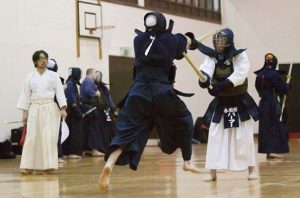 How did you interest in kendo? What it means to you?
How did you interest in kendo? What it means to you?
It is a very interesting martial art from Japan, which I took up when I was in my early 20’s – I was looking for a meaningful activity that had discipline and structure and more than a competitive sport. I practice an ‘old school’ I.e. one that pre-dates the modern sport kendo. It’s hard to explain how important Kendo is to me. The principles are about continuous learning and development and luckily no need to stop when you get past the age that competitive sport becomes difficult to sustain.
Do you see any similarities between kendo and aviation?
Like other industries Aviation succeeds when everyone involved seeks continuous improvement – in skills, performance, technology and service. In that way it’s the same. There are always similarities between activities but I wouldn’t go too far with this comparison.
Sometimes people say that aviation is an illness (in a good way, of course!). They say that once it catches you, you fell in love with it for the rest of your life. Do you agree?
There are very few cures and withdrawal symptoms can be severe. That said there are many lessons that Aviation and other industries can share with each other so it’s not necessarily a lifetime career. Life long attraction certainly!
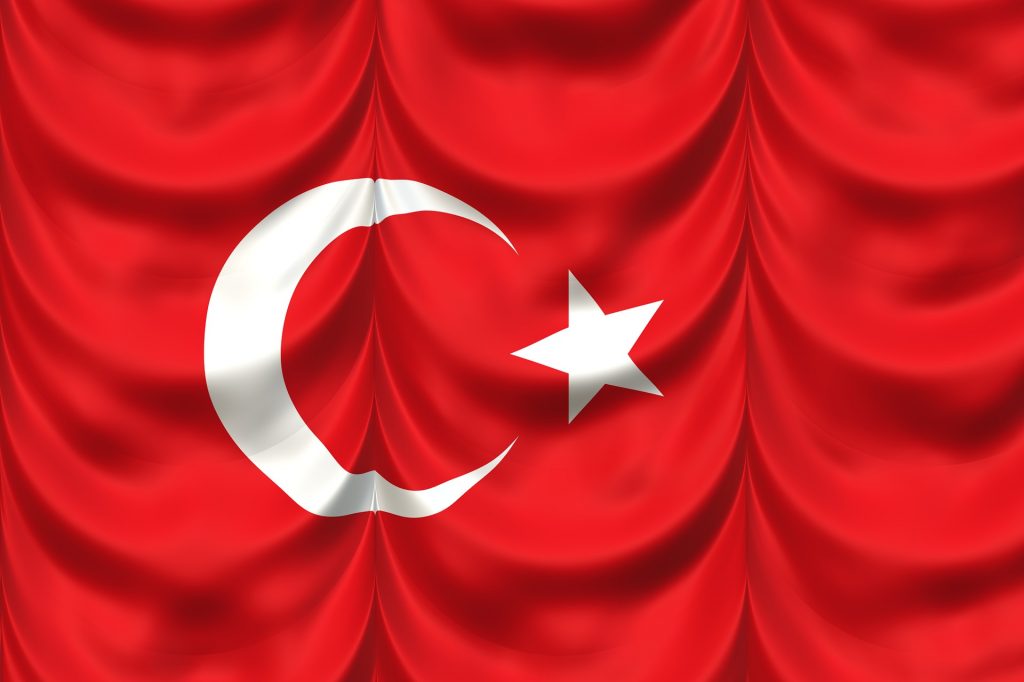
Turkish Days
On May 15-16th Turkish Days will take place at Kazimieras Simonavičius University. 3 lecturers from Adnan Menderes University (Aydin, Turkey) come to KSU to held 4 interesting and relevant lectures. Come and see!
May 15th, 14:20 – 15:50 (210 auditorium)
Alper YILMAZ, Adnan Menderes University
“Use of Propaganda in the world and in Turkish Political Life since 20.century till recent years”
The propaganda which aims to change the minds of people in a convincing way, has been a serious factor used by governments, political parties, non-governmental organizations and so many actors in order to reinforce their power. Since First World War until now, propaganda has evolved in a soft way, from militaristic methods seen such as in Nazi-party period by Hitler to technological and cultural methods, especially after the Cold War period under the leadership of the U.S. Soft power and public diplomacy methods has been frequently used in order to influence foreign public opinion and become dominant in the region, also Turkey gave importance to these methods. Consequently, this course designed to examine propaganda methods seen specifically in Turkish political life after II.World War until now. That’s why, it can be created an opportunity in order to make a comparison between propaganda methods in Turkey and Lithuania.
May 15th 16:05 – 17:35 (210 auditorium)
Ahmet AKBULUT, Adnan Menderes University
“What makes a leader effective?”
There are various types of leadership theories that determines effectiveness of leaders. One of them is “trait theories” which emphasize the traits or qualities of leaders, which lead to their ability their effectiveness. The “behavioural theories” sought to identify the specific behaviours of leaders that lead to their leadership success. The other one is “contingency theories” that states effectiveness of leadership is related to the interplay of a leader’s traits, behaviours and other situational factors. Moreover, the charismatic leadership is the guidance provided to an organization by one or more individuals seen as heroic or inspiring and who have therefore been granted the organizational power to make dramatic changes and extract extraordinary performance levels from its staff.
The other theory is “transactional leadership theory” bases leadership on a system of rewards and punishments that are contingent upon the performance of the followers. In addition to that, transformational leadership that a process where “leaders and their followers raise one another to higher levels of morality and motivation.” In this study, I will be mention about all these theories in order to show how a leader should be control and persuade the groups and society.
May 16th, 17:40 – 19:00 (210 auditorium)
Dr. Ali Erdem AKGÜL, Adnan Menderes University
Topics:
Dr. Ali Erdem Akgül specialty areas in academic life are: “Popular culture and media”, “Citizen-State Relation”, “Surveillance, Trust and Internet” and “Social-Political Movements and Social Media”.
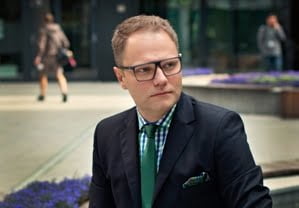
Dr. Marcin Białecki
May 18th 5.40 p.m. Dr. Marcin Białecki from Cardinal Stefan Wyszyński University (Warsow, Poland) will held a lecture at Kazimieras Simonavičius university.
The topic of the lecture is “Mediation in civil cases concerning The Hague Convention on Civil Aspects of Child Abduction. Recent developments in Polish Civil Procedure from theoretical and practical perspective”.
The aim of this mobility is to provide an analysis of the institution of mediation as an alternative means of resolving disputes under Polish civil procedure. The hypothesis Dr. Marcin Białecki has adopted not only focuses on particular provisions of the Code of Civil Procedure and other legislation concerning mediation, but concentrates first and foremost on the function of the solutions put in place and their usefulness, applying basic research methods, namely, legal dogmatism and comparative analysis.

Kazimieras Simonavičius University
On the 25th of April, the agreement on institutional cooperation among Kazimieras Simonavičius University (KSU, Lithuania), University of Nicosia (UNIC, Cyprus) and Yaroslav Mudryi National Law University (NLU, Ukraine) within the framework of master programmes was signed. Students of these universities will be able to gain Master degree from three Universities within 2 years study period.
Yaroslav Mudryi National Law University was established in 19th century and is a leading university in Ukraine in the field of Law. It has more than 23 thousands of students.
University of Nicosia is the biggest university in Cyprus and has more than 11 thousands of students from over than 70 countries. School of Law of University of Nicosia has more than 20 years of experience in the provision of a top-tier legal education.
According to the signed agreement, universities will cooperate leading to the following post-graduate degrees: an MA degree in Law and Politics in the European Union (UNic), LL.M. in European Union Law and Global Challenges (KSU) and a Master degree in International Public Law (NLU).
1 study – 3 diplomas
The students of KSU’ LL.M. European Union Law and Global Challenges study programme have the possibility to be awarded Master degree from three Universities within 2 years:
Students of KSU LL.M. European Union Law and Global Challenges study programme may choose to study:
Students have to study at least one semester at the universities they choose.
Please, note that University of Nicosia provides online studies so students do not have to go to Cyprus to study and may stay in their homeland country.
International study model – unique and flexible
KSU Law faculty’s dean dr. Aida Kišūnaitė says “For lawyers it is very important to have a wide network of contacts. This international study programme allows to expand students network in three countries! It increases employment possibilities in the international context.
It is also important to notice that this study programme is very flexible: the student is free to choose not only the partners’ university and semester in which he/she wants to study there, but also the study subjects.
This integrated study model is very convenient from time and financial perspectives: instead of three different studies, which would last for 6 years, a student studies only 2 years. It also widens the horizons of knowledge because three different Law study programmes are integrated. Upon the completion of the studies, the student is awarded three separate diplomas from each partner university”.
Duration: 2 years (1,5 years for those who choose to study only at KSU or at KSU and the University of Nicosia).
Language: English
Degrees: Master in Law (Kazimieras Simonavičius University), Master in Law and Politics in EU (University of Nicosia) and Master in International Public Law (Yaroslav Mudryi National Law University)
For more information please contact: dr. Aida Kišūnaitė (e-mail: aida.kisunaite@ksu.lt, tel. nr. +370 5 213 5172).
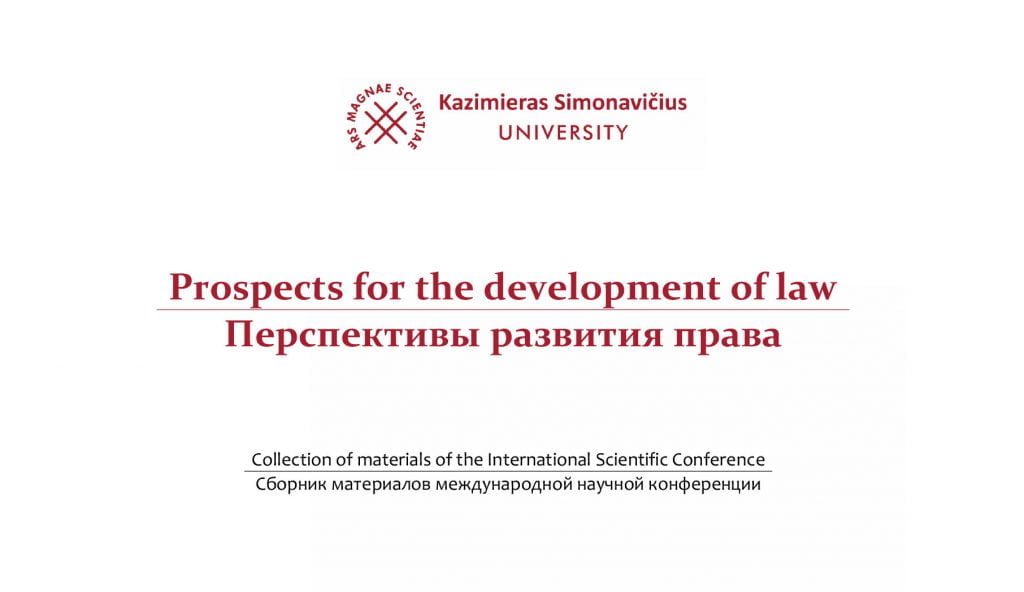
International Conference
Kazimieras Simonavičius University organized the international conference Prospects for the Development of Law. 68 academicians, professors, associate professors, doctoral students, undergraduates and students from Russia, Ukraine, Belarus and Kazakhstan participated in the conference.
Organizing Committee memebers were Aida Kišūnaitė, Doctor of Law, Dean of the Faculty of Law of the University, Ryšardas Burda, Doctor of Law, Professor, Raimundas Kalesnykas, Doctor of Law, Professor, Konstantin Ivanov, Doctor of Law, Associate Professor.
You can find the Report on the Conference here: Conference KSU report (English)
You can find Collection of materials of the International Scientific Conference here: Collection of materials of the International Scientific Conference (Russian)